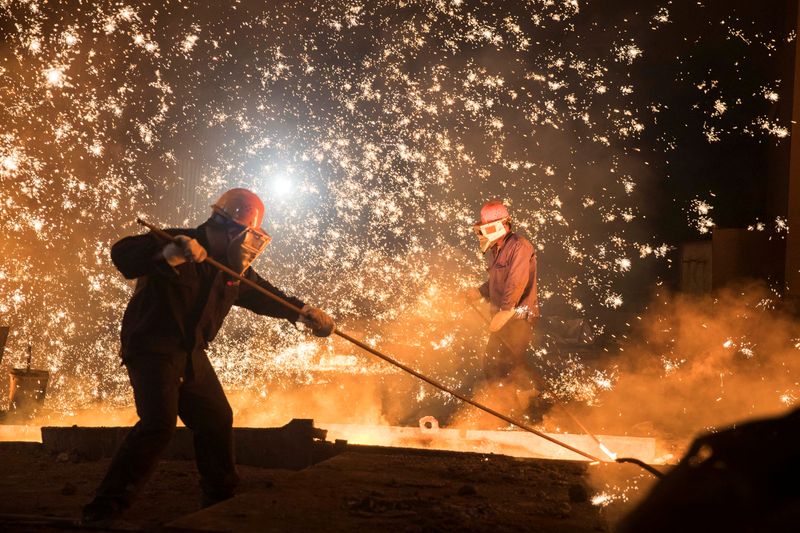By Min Zhang and Ryan Woo
BEIJING (Reuters) -Debt problems at a major Chinese property developer have now spilled over into a vital artery of the nation's industrial engine - the steel sector - and started to ripple through to other critical parts of the world's second-largest economy.
The spreading balance-sheet crisis at real estate firms is a warning for policymakers as a swing in the fortunes of the steel industry would have significant repercussions for China's economy, with cement, glass, and household appliances all vulnerable to demand drops.
Already, steel prices are down from their record highs seen earlier this year due to easing demand from construction activities, which account for over half of the metal's consumption, while steelmakers' share prices have also been hurt.
Steel's acute sensitivity to the ebbs and flows in construction and manufacturing makes it a closely-tracked bellwether for China's economy, which has started to slow down from the second quarter https://www.reuters.com/world/china/china-q3-gdp-growth-hits-1-year-low-raising-heat-policymakers-2021-10-17. Steel firms are also massive employers that support a vast supply chain.
Hitting steel operations, real estate developers have dialled back investment in projects to conserve cash in a sector squeezed by tighter borrowing regulations that have engulfed indebted companies, most notably China Evergrande Group https://www.reuters.com/business/chinas-kaisa-kicks-off-12-bln-debt-restructuring-after-missing-pay-date-source-2021-12-09.
"We normally stockpile steel products in winter at relatively lower prices and sell them after the new year holidays when consumption resumes. But we are holding off this year," said Qi Xiaoliang, a Beijing-based steel trader.
"There's still uncertainty in the real estate market for 2022 and the situation is not expected to be fully reversed for another six to 12 months," he added.
In the final quarter of 2021, the property market took a further hit as the unease in the sector shook already weak buyer sentiment, with unsold housing stock in China's 100 biggest cities reaching a five-year high in November.
Demand for homes is expected to ease further in 2022, hitting downstream manufacturers of household products.
Cement production, another construction material, was down around 16% for September-November year-on-year, and was lower versus the same period between 2017 and 2019. Demand for earth excavators has also dropped off in recent months.
The broadening spillover impact of the property downturn was also seen elsewhere. In the appliances industry, for example, monthly refrigerator output has been falling since May through to November on an annual basis.
REVERSAL IN FORTUNES
Steel producers were among the best performers of the entire Chinese economy over the first three quarters of 2021, with China's 28 major listed mills pocketing over 106 billion yuan ($16.61 billion) in net profits, up 174% year-on-year and 129% higher than in pre-pandemic 2019.
But the boom times in the steel sector are over. The paralysis that has struck China's mammoth construction industry is triggering a rare contraction in building activity across the country.
New construction starts by floor area have contracted from a year earlier since July - their longest stretch of declines since 2015.
The slowdown in the real estate sector has dented China's monthly crude steel output by more than 20% since September.
The closely-tracked steel equity instruments and commodities futures have captured the reversal of fortunes.
After gaining roughly 90% through mid-September, the CSI steel equities index has plunged 27% since, while futures prices for construction materials rebar and wire rod have tumbled 24% and 31% respectively from their historical highs to erase almost all their gains this year.
As steel producers hit the brakes, the key inputs used in steelmaking have also taken a shellacking, with Dalian Commodity Exchange iron ore futures down more than 45% from their record in May.
Gross profits for steel rebar have started to trend down from the peak seen in late September.
UNCERTAIN OUTLOOK
Property-related sectors are the single biggest contributor to China's economy, accounting for 28% of GDP in 2021, down from a recent peak of 35% in 2016.
The GDP share is broken down into a 7% direct contribution from property and a 21% indirect contribution from construction and through sectors along the supply chain such as machinery and equipment, according to Moody's (NYSE:MCO).
A government industry consultancy forecast China's steel demand will slip 0.7% in 2022, following an expected 4.7% decline this year.[nL1N2T102U]
Looking ahead, any extended credit constraints "could reduce demand for metals used in construction as developers lose the ability to pay for raw materials at high prices," analysts with Fitch Solutions wrote in a recent note to clients.
If the contraction in construction spending endures, it will then affect the producers of appliances and white goods that constitute a key part of China's critical manufacturing base.
"Property construction has been the engine of China's economy for over two decades now," said Frederic Neumann, Co-Head of Asian Economics Research at HSBC.
"With building activity likely to remain depressed for quite some time, growth will inevitably shift down a gear or two."
($1 = 6.3813 Chinese yuan renminbi)
